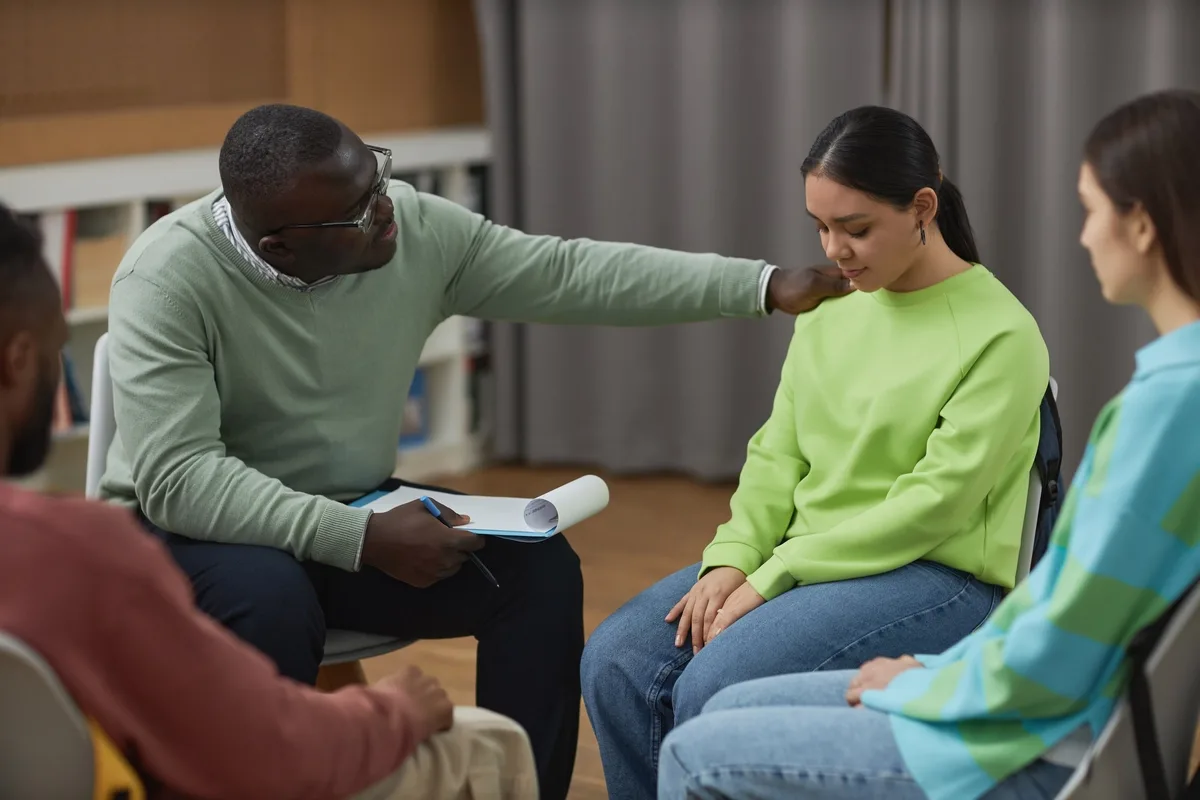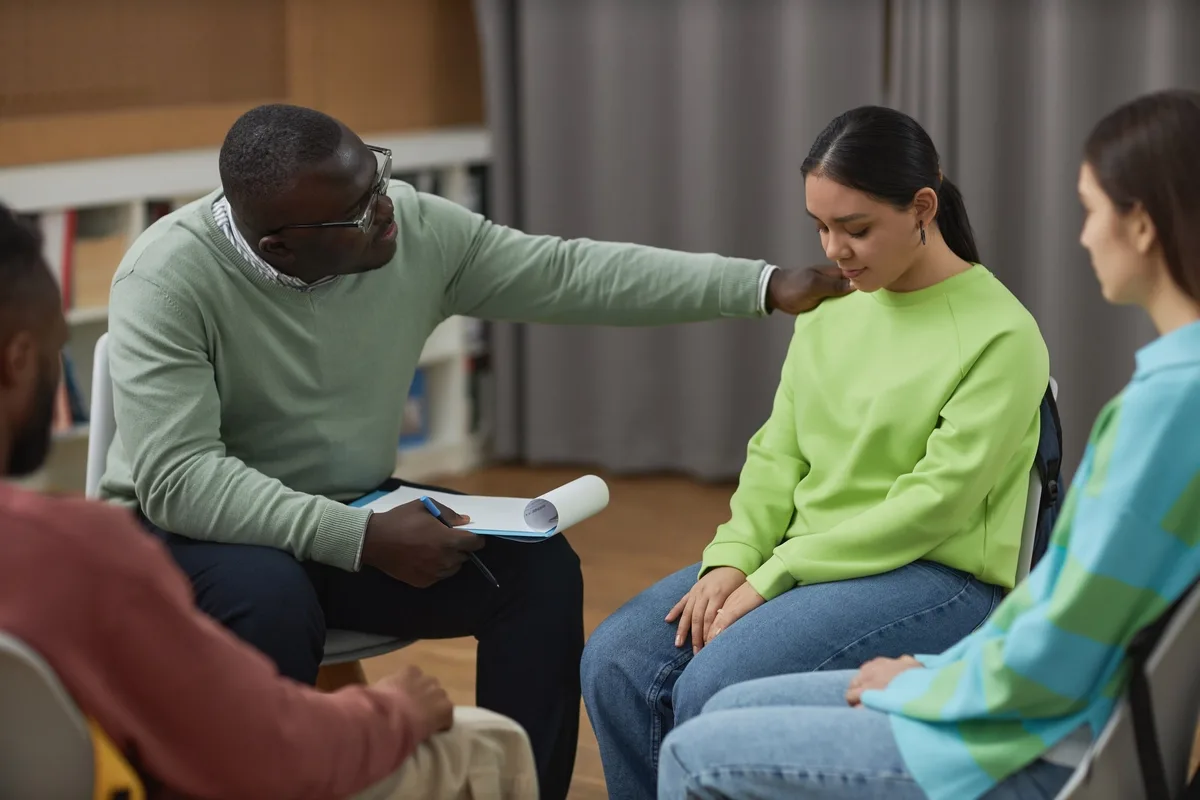24/7 Helpline:
(866) 899-111424/7 Helpline:
(866) 899-1114
Learn more about PTSD Rehab centers in Benicia
PTSD Rehab in Other Cities

Other Insurance Options

Meritain

Anthem

BHS | Behavioral Health Systems

Carleon
Beacon

Providence

Sutter

MVP Healthcare

Health Net

Optima

WellPoint

Horizon Healthcare Service

EmblemHealth

Medical Mutual of Ohio

Lucent

Covered California

Oxford

Humana

Self-pay options

Magellan Health









MedMark Treatment Centers
MedMark Treatment Centers, in Vallejo, California, is an outpatient drug rehab for adults in opioid ...

Genesis House
Genesis House is a drug and alcohol treatment program for adults with substance use disorders. Locat...

Shamia Recovery Center
Shamia Recovery Center offers inpatient treatment for women with alcohol and/or substance addiction....

Solano County Mental Health – Children’s Services
Solano County Mental Health – Children’s Services is a public rehab located in Vallejo, California. ...

House of Acts I
House of Acts I is a non-profit and faith-based, residential social model program for those men in r...

Crestwood Recovery Center
Crestwood Recovery Center is a private rehab located in Vallejo, California. Crestwood Recovery Cent...

Bi Bett Corp Southern Solano Alcohol Council
Bi Bett Corp Southern Solano Alcohol Council is a private rehab center located in Vallejo, Californi...

Sinnissippi Centers – Dixon Office
Sinnissippi Centers - Dixon Office provides a wide range of treatment services for mental health and...

Family Services – Chemung County Crisis Program
Family Services – Chemung County Crisis Program is a private rehab located in Elmira, New York. Fami...

Youth Advocate Programs – Chemung County
Youth Advocate Programs (YAP)–Chemung County is a community based behavioral and mental health care ...

Salvation Army
Salvation Army is a non-profit rehab located in Elmira, New York. Salvation Army specializes in the ...






Alcohol and Drug Abuse – Latino Family Services
Alcohol and Drug Abuse – Latino Family Services is a private rehab located in Vacaville, California....

Latino Alcohol and Drug Abuse Services
Latino Alcohol and Drug Abuse Services is a private rehab located in Vacaville, California. Latino A...

Principles Alcohol & Drug Recovery Program
Principles Alcohol & Drug Recovery Program is a private rehab located in Vacaville, California. Prin...

Anka Behavioral Health – Hope Program
Anka Behavioral Health - Hope Program is a non profit rehab located in Vallejo, CA. Anka Behavioral ...

House of Acts II
House of Acts II is a non-profit and faith-based, residential social model program for those men in ...

Solano County Mental Health – Children’s Services
Solano County Mental Health – Children’s Services is a public rehab located in Vacaville, California...

Bi Bett Corp – Recovery Connection
Bi Bett Corp – Recovery Connection is a private rehab located in Vallejo, California. Bi Bett Corp –...

Healthy Partnerships
Healthy Partnerships provide outpatient treatment for individuals with alcohol and/or substance addi...

AA – Alcoholics Anonymous
AA – Alcoholics Anonymous is a non-profit rehab located in Vacaville, California. AA – Alcoholics An...

Ia’tik Recovery Center
Ia’tik Recovery Center is a private rehab located in Vallejo, California. Ia’tik Recovery Center spe...

AA – Alcoholics Anonymous
AA – Alcoholics Anonymous is a non-profit rehab located in Vallejo, California. AA – Alcoholics Anon...

Sinnissippi Centers – Town Square Centre
Sinnissippi Centers–Town Square Centre is an integrative mental health care and addiction recovery f...

Sinnissippi Centers – Parks Place
Sinnissippi Centers - Parks Place is located on Depot Avenue in a residential area with easy access ...

Family Services of Chemung County
Family Services of Chemung County is a private rehab located in Elmira, New York. Family Services of...

AMS – Family Services of Chemung / Eastside Family Medicine
The purpose of Family Services is to assist individuals, families and the community in meeting the c...

CASA Trinity of Chemung County
CASA Trinity of Chemung County is a private rehab located in Elmira, New York. CASA Trinity of Chemu...

Southern Tier Alcohol Rehab
Southern Tier Alcohol Rehab is a private rehab located in Elmira, New York. Southern Tier Alcohol Re...

AA – Alcoholics Anonymous
AA – Alcoholics Anonymous is a non-profit rehab located in Elmira, New York. AA – Alcoholics Anonymo...

Elmira Psychiatric Center
Elmira Psychiatric Center is a public rehab located in Elmira, New York. Elmira Psychiatric Center s...

Trinity of Chemung County
Trinity of Chemung County is a private rehab located in Elmira, New York. Trinity of Chemung County ...

Alcohol and Drug Abuse Council
Alcohol and Drug Abuse Council is a private rehab located in Elmira, New York. Alcohol and Drug Abus...

Elmira Psychiatric Center – Youth Outpatient
Elmira Psychiatric Center – Youth Outpatient is a public rehab located in Elmira, New York. Elmira P...

















































































